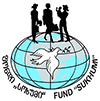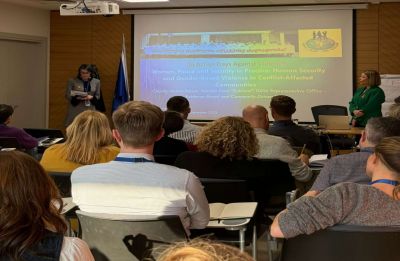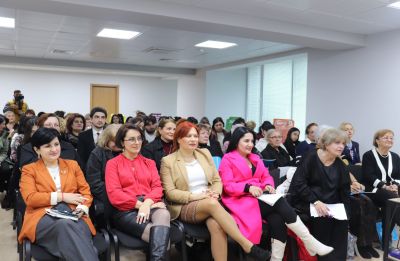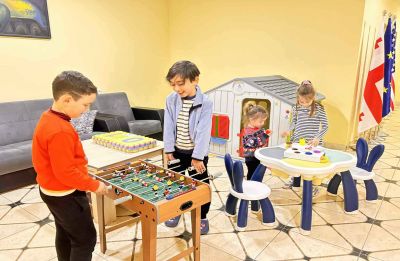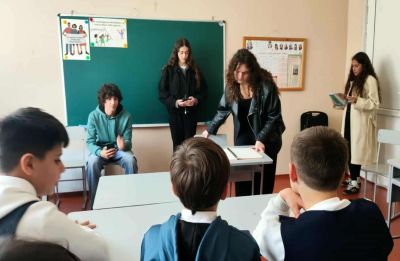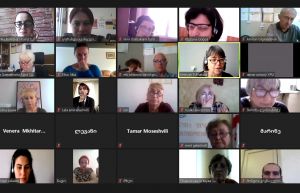Relationships between children and parents, conflict and ways to resolve it, leadership skills - online trainings with youth clubs in Zugdidi, Tsalenjikha, Senaki, Chokhatauri, Kobuleti and Terjola were devoted to these topics.
The trainings included discussions, discussion of specific cases, frank conversations. Interesting topics were actively discussed by the participants. The training participants discussed the problems of generations, the stages of the conflict. One part of the youth expressed a desire that leadership should be taught as a school subject.
The project is implemented with the support of the organization Brot
für die Welt - Evangelischer Entwicklungsdienst (Germany)
Ingiri, Shamgona, Kakhati - residents of different ages living in these villages, IDPs and local citizens, were familiarized with the essence of the online application and with the rules for using it by the project facilitators. The participants of the meeting not only listened to the information about the online-vote-o-meter with interest, but also held a discussion on the topic of elections and socio-political life in general. They focused on the issues, on which, according to them, the political actors, participating in the elections, should sharpen their attention - uncontrolled migration, the integration of IDPs, local employment programs and other issues.
The project is implemented with the support of Kvinna till Kvinna,
women’s Foundation (Sweden)
A cycle of informational meetings continues in Zugdidi municipality, in order to get acquainted with the online application. Despite the limitations, the facilitators arrange individual meetings and try to deliver information to the vulnerable groups, including people with disabilities, and families with many children as much as possible.
The beneficiaries like this innovation very much and are going to use the platform to get information about the programs of political actors.
The project is implemented with the support of Kvinna till Kvinna,
women’s Foundation (Sweden)
In accordance with the recommendations of health care, the meeting with the part of the youth in Zugdidi was held offline and with the other part – online. The meeting concerned the online "vote-vote-o-meter" – voters’ advice application, implementation of the application, pre-election informing of the voter.
The participants expressed the desire to use the application after its activation. It was said that they never have full information about the programs of political parties, so such an application is very interesting for them.
The project is implemented with the support of Kvinna till Kvinna,
women’s Foundation (Sweden)
Koki, Orsantia, Zugdidi - informational meetings are actively held in these villages of Zugdidi municipality. Voters get acquainted with the online-vote-o-meter, with its essence and meaning. Due to the pandemic, meetings were held with small groups or individually. Citizens are expressing great interest in this innovative platform.
The project is implemented with the support of Kvinna till Kvinna,
women’s Foundation (Sweden)
Another civil society organization, “People and Freedom”, has been established in Vani municipality. Like other new organizations, it also took part in a grant competition and implemented a three-month project “Informed Youth”.
As a result of the project, a youth initiative group was formed and equipped with the appropriate skills in Salkhino community. Young people know a lot about the role of government and e-services. They identified the needs of young people and provided recommendations to the local government. The initiative group is actively working with the local community to promote the use of online services.
The project is implemented with the support the European Union - #EU4Georgia
“Vani - XXI century” - this civil society organization in Vani municipality registered a few months ago with the support of the Fund “Sukhumi”, and within the framework of our project has already implemented a small project “Informed Village Population”.
The result is obvious: certain groups living in the administrative units of Vani, Zeda Vani, Chkvishi and Zeindari were provided with information on public administration reform, on the importance of using e-services.
The project participants got acquainted with the main directions of the municipality's website. They have the opportunity, to cooperate with the local government in case of necessity, to receive and provide information, to be involved in the activities of the local government.
The project is implemented with the support the European Union - #EU4Georgia
Useful, creative, timely...
According to the participants, the training was of such kind, where the trainers told about methods of communication and PR and raising awareness to representatives of civil society organizations in 8 municipalities.
Despite the online format, the participants were actively involved in the training process. For them, the information presented on the background of practical examples on topical issues turned out to be important: defining the target audience, planning and managing effective communication, managing the web page and social media.
The project is implemented with the support the European Union - #EU4Georgia
Khoni working group is actively working according to its plan. During the next online meeting, the members of the group considered the issues identified as a result of the monitoring. It was noted that one more recommendation has been implemented: City Council has established specific days for receiving citizens - 2 days a week, which had not happened before. This order was posted on the official website of the municipality.
The meeting also discussed the Code of Ethics. It was noted that Knoni municipality would adopt a code of ethics based on a permanent order and not on a single decree. Until the next meeting, the members of the group will work in an active consultation mode.
The project is implemented with the support the European Union - #EU4Georgia
The last, twelfth, forum was held in an online format. The members of the Civil Society Organizations Forum summarized the implemented projects, highlighted the results, changes and impact on society.
Creation of an anti-corruption plan, studying the needs of women and development of recommendations for local authorities, studying the needs of persons with disabilities, supporting the improvement of gender policy, introducing gender budget and civic budgeting, updating the web pages, creating of an e-petition application are part of the results of grant applications in 8 municipalities.
Local civil society organizations have already achieved success in terms of implementing public administration reform.
The project is implemented with the support the European Union - #EU4Georgia
